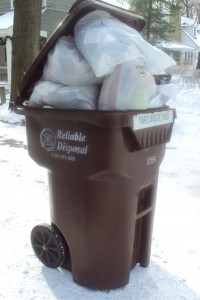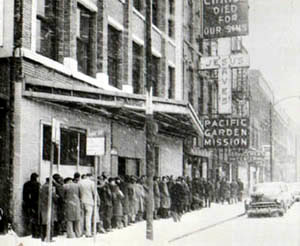The 20th century was characterized as one of over-consumption, particularly in the United States.
For instance, I remember when disposable diapers came into being. Although Pampers were on the market in the early 1960’s, Nate and I didn’t try them until 1977, when we had three little ones. We used disposables as a luxury when taking our babies to the church nursery or friends’ homes. Cloth diapers had to be rinsed in the toilet, then packed in plastic and taken home for washing.
These days disposable diapers are big business, and very few parents use cloth. On the plus-side, they’re sterile enough for the most sensitive bottom, and of course they eliminate the need to stand over a toilet bowl. On the down side, disposables have become difficult to dispose of, filling landfills and producing strange gasses as they decompose.
But diapers aren’t the only thing we throw away these days. Hospitals are also famous for their volume of waste. For example, delivery room drapes used to be made of cotton, washed and returned to the maternity floor in neat stacks looking much like any homemaker’s laundry. In the 1980’s disposable drapes arrived, and waste volume grew. The list of hospital disposables is lengthy, but they aren’t the only culprits.
Statistics prove we throw away nearly half of the edibles available to us, too, and the packaging they come in keeps our garbage trucks rolling. Recycling has helped as we’ve slowly learned how to do it, although in Michigan where we live, the programs are still “haul-your-own.”
What does God think of waste and recycling? He might say, “I gave you a beautiful world to enjoy, chuck full of riches. Take care of it with excellence.”
In the Garden of Eden, he gave Adam and Eve dominion over everything he’d created, which didn’t mean they could neglect or ruin it but should care for it with wisdom. I wonder if Adam and Eve had to guard how they viewed the earth and its animals. Being as involved as they were, naming them, tending the gardens, living off the fruit of the land, did they ever ascribe higher status to the creation than God had intended? All of it must have been a wonder to them.
Today it’s not difficult to get off track. In our desire to conserve natural resources, we’re liable to elevate the elements to idol status. God created everything, but God is not in everything. His influence can be seen in all parts of the natural world, but nature is not to be worshipped. Once in a while the line between appreciation and reverence becomes blurred.
A good question is, “How much thought and time do I spend on caring for the earth, compared to thought and time spent with the Lord?”
I’ve decided not to worry about the mountain of diapers in our trash can. We’re just working to care for five little bottoms, and all of them are part of God’s creation.
“The earth is the Lord’s, and everything in it. The world and all its people belong to him.” (Psalm 24:1)




